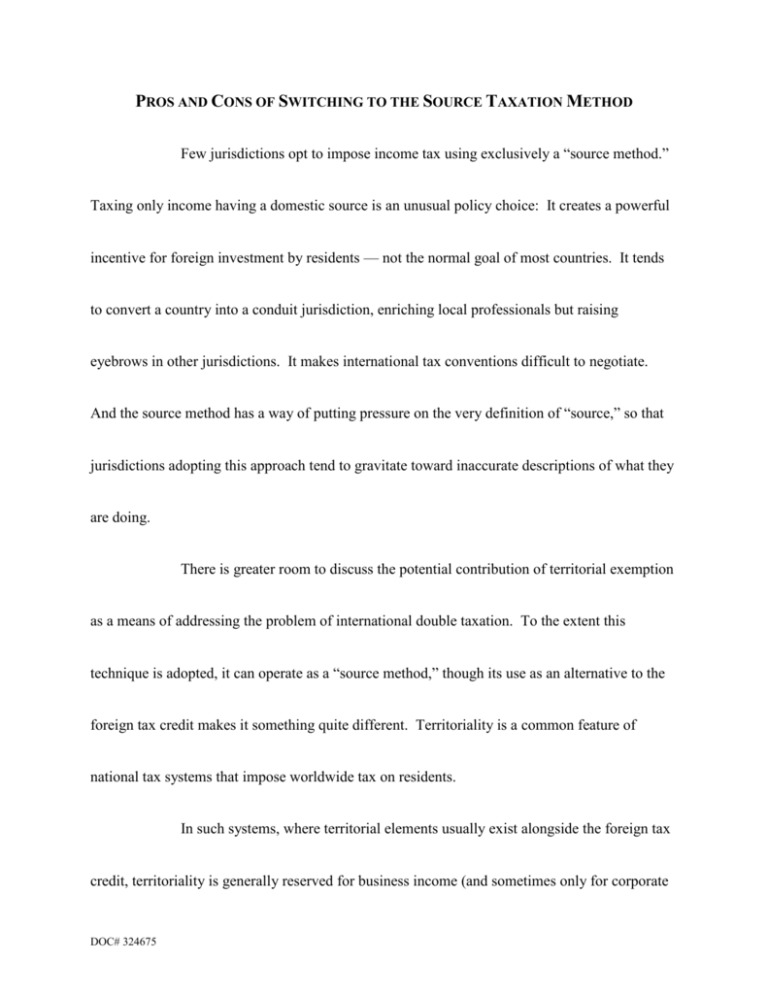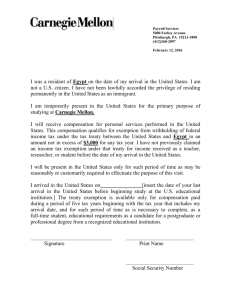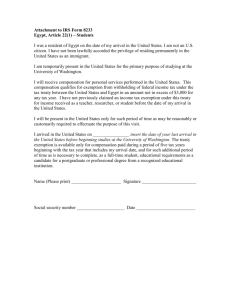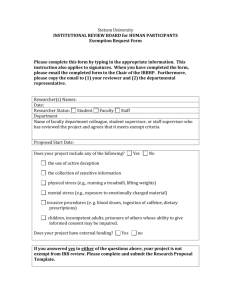pros and cons of switching to the source taxation method
advertisement

PROS AND CONS OF SWITCHING TO THE SOURCE TAXATION METHOD Few jurisdictions opt to impose income tax using exclusively a “source method.” Taxing only income having a domestic source is an unusual policy choice: It creates a powerful incentive for foreign investment by residents — not the normal goal of most countries. It tends to convert a country into a conduit jurisdiction, enriching local professionals but raising eyebrows in other jurisdictions. It makes international tax conventions difficult to negotiate. And the source method has a way of putting pressure on the very definition of “source,” so that jurisdictions adopting this approach tend to gravitate toward inaccurate descriptions of what they are doing. There is greater room to discuss the potential contribution of territorial exemption as a means of addressing the problem of international double taxation. To the extent this technique is adopted, it can operate as a “source method,” though its use as an alternative to the foreign tax credit makes it something quite different. Territoriality is a common feature of national tax systems that impose worldwide tax on residents. In such systems, where territorial elements usually exist alongside the foreign tax credit, territoriality is generally reserved for business income (and sometimes only for corporate DOC# 324675 -2income). Easily movable portfolio investments should not normally give rise to exempt income even when they accompany business operations of magnitude — or, if they are allowed to so qualify, the amount should be limited and exemption closely monitored for abuse. The question is whether the income is justifiably earned abroad, for non-tax reasons; it is conceivable that some amount of what might otherwise be considered passive investment income could meet that standard in the context of foreign business activity. The key difference between the “source method” or “source principle,” on the one hand, and partial exemption for designated types of foreign income, on the other, lies not in the exemption itself — common to both approaches — but in the rationale. Advocates of the “source method” appear to believe that the economic contribution of the source country to the earning of income justifies exclusivity — or alternatively, that it is simply too difficult to enforce laws that depend on obtaining information from abroad. The exemption method of relieving double taxation is based not upon some general belief in the economic virtues of taxation at source but rather upon the desirability of adopting adequate and cost effective measures against double taxation. -3These are very different conceptual justifications for rules that, to the untutored eye, may appear similar. The differences in justifications are, however, highly instructive in indicating where the policies might lead. A Starting Point for Territoriality For an exemption feature within a regime aimed generally at relieving double taxation the next pressing question following the decision to focus on business income is: precisely what business income? The goal, after all, is to combat double taxation. That does not justify exemption for all business income, wherever earned and however taxed abroad. Arguably, exemption should not be extended to income that bears little or no foreign tax, since there is no double tax to relieve in such cases. The demands of tax administration argue for across-the-board rules that can be applied without recurring to the policy-maker or the courts with every individual case. I have previously suggested that general rules might begin with the tax treaty network, because it is presumed — not assured, but presumed — that treaties are negotiated for the purpose of relieving international double taxation. That implies, in general terms, that the majority of treaty partners can be expected to have tax systems designed for the purpose and effect of collecting -4tax. However, since every country’s treaty network is infected by agreements that should never have been agreed, by agreements with jurisdictions whose domestic laws have changed, and by agreements (otherwise) on the verge of termination, it seems prudent to allow for exceptions to the principle that the treaty network establishes a baseline for exemption. The exceptions would best be established and administered by persons charged with handling the treaty program as a whole — in the United States, the U.S. Treasury Department . Within each treaty the permanent establishment provisions furnish a ready-made set of rules for defining the type of operation and income that might qualify for exemption. It is fairly easy to translate “source method” taxation into exemption for income attributable to a permanent establishment. In addition, although the permanent establishment concept is used in treaties only for portions (branches) of residence country taxpayers, it would not be difficult to extend the relevant concepts, in laws defining the scope of the exemption, to separate entities. By its nature the principle of territoriality would apply not only to income as earned but to the repatriation of retained income and the disposition of assets that produce exempt income, including shares of entities that earn exempt income. -5The Hard Questions That leaves two major obstacles to overcome in fashioning an exemption feature. What is to be done with respect to countries that have genuine and functioning tax systems but with which there is, for some reason, no treaty? For the United States, such countries would include virtually all of South America (for example). And — perhaps an even more vexing problem — what treatment should be extended to jurisdictions that may not have general tax systems in place but that host substantial investment from abroad, for example in the natural resource sector, and that impose a tax on the income from that activity? Kuwait might be an example here. Elsewhere I have expressed the view that an exemption regime should be extended to the first type of jurisdiction. I am no longer quite so clear about that, because the benefit of exemption would constitute a powerful tool for seeking to expand the treaty network. As long as there is an alternative to exemption available, in the form of a foreign tax credit, it would not necessarily be punitive or distortive to withhold exemption from a country with a real tax system but no tax treaty. Moreover, a decision to extend exemption unilaterally to non-treaty -6countries would entail the difficult and politically delicate task of evaluating tax systems, and perhaps rejecting some. Regardless of what choice is made, a “white list” of jurisdictions where exemption would be the rule should be compiled and maintained. If non-treaty countries are to be included, the list will be far easier to administer than attempting to craft a rule geared to the amount of tax levied or some other surrogate for an identification of “real” tax systems. There will also inevitably be jurisdictions that attract (and tax) investment from abroad but lack fully developed tax systems. It would not be appropriate to leave investors in these countries without any relief from international double taxation. The question is whether exemption might be extended to them as well, or whether the appropriate policy response is reliance on the foreign tax credit. One benefit of a territorial feature is the potential for limiting application of the credit, with all its complexity and potential for being “gamed.” It is probably not possible to dispense with the credit altogether, given the discomfort that would attend upon using territoriality with respect to jurisdictions where there is no general tax system. The credit would play a very different role as residual or “secondary” technique, however, and might be subject to -7much tighter restrictions than under the rules that apply when it is the only means of relief from double taxation. The Collateral Issues Territoriality to any extent holds implications for many other aspects of international taxation, including the treatment of outbound transfers of appreciated property, transfer pricing, expense allocation and apportionment for purposes of associating deductions with the income they generate, and the negotiation of tax conventions. One beneficial aspect of a foreign tax credit system is that the tax base remains integral. Primary jurisdiction may be ceded to other countries but the residence country stays in the background, with residual taxing rights. This places much less strain on tax policy than a rule that abandons a portion of the tax base. In the latter situation, outward transfers of appreciated property would have to be taxable events, since the prevailing rule beyond the border would generally be exemption. The expense allocation rules would similarly have to be converted to rules of non-deductibility. It makes little sense for a residence country to exempt a slice of income on territorial grounds while allowing expenses incurred for the purpose of earning that income to be deducted from fully taxed other income. Or, to make a slightly different point, it makes little sense to adopt that -8combination of rules unless the aim is to create a deliberate incentive to foreign investment. That, of course, may be the case — but it holds serious implications for trade policy, state aid, and a host of legal provisions not directly associated with international taxation. Finally, the advent of territoriality would remove one of the major props of the current transfer pricing rules. With no possibility of future taxation once income is lodged abroad, rules having greater automaticity (i.e., formulas) would have to be employed, if only as presumptions. And the Treaties? A territorial feature in a tax system holds consequences for tax treaty negotiation. Other countries may see concessions in bilateral negotiations as not justified when the treaty partner is failing to tax its residents’ foreign income. Furthermore, questions about treaty shopping become more acute when a treaty partner provides benefits for investments beyond its borders. The task of reaching agreement becomes more difficult, and ensuing discussions require more care. It is obviously not impossible to achieve treaties with nations that espouse elements of territoriality, but the conduit investments that come with territoriality are a cause for concern. -9Conclusion The U.S. system for taxing foreign income is top-heavy, cumbersome, subject to abuse, and utterly out of step with many other nations’ ideas of sound tax policy. The system should be stream-lined, simplified, and rendered more transparent. The concept of territoriality, not as a “source method” but as a tool at the service of general tax policy, could play an important role in that development. H. David Rosenbloom Caplin & Drysdale, Chartered Washington, DC 20005 April 7, 2009







